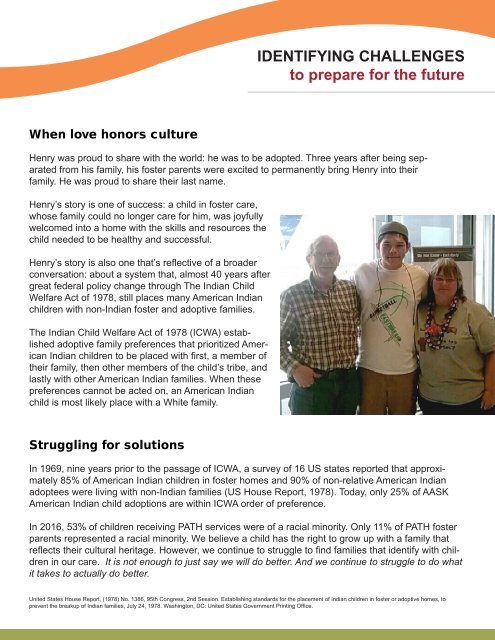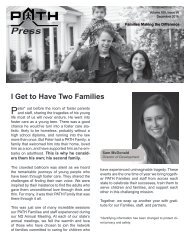Create successful ePaper yourself
Turn your PDF publications into a flip-book with our unique Google optimized e-Paper software.
IDENTIFYING CHALLENGES<br />
to prepare for the future<br />
When love honors culture<br />
Henry was proud to share with the world: he was to be adopted. Three years after being separated<br />
from his family, his foster parents were excited to permanently bring Henry into their<br />
family. He was proud to share their last name.<br />
Henry’s story is one of success: a child in foster care,<br />
whose family could no longer care for him, was joyfully<br />
welcomed into a home with the skills and resources the<br />
child needed to be healthy and successful.<br />
Henry’s story is also one that’s reflective of a broader<br />
conversation: about a system that, almost 40 years after<br />
great federal policy change through The Indian Child<br />
Welfare Act of 1978, still places many American Indian<br />
children with non-Indian foster and adoptive families.<br />
The Indian Child Welfare Act of 1978 (ICWA) established<br />
adoptive family preferences that prioritized American<br />
Indian children to be placed with first, a member of<br />
their family, then other members of the child’s tribe, and<br />
lastly with other American Indian families. When these<br />
preferences cannot be acted on, an American Indian<br />
child is most likely place with a White family.<br />
Struggling for solutions<br />
In 1969, nine years prior to the passage of ICWA, a survey of 16 US states reported that approximately<br />
85% of American Indian children in foster homes and 90% of non-relative American Indian<br />
adoptees were living with non-Indian families (US House <strong>Report</strong>, 1978). Today, only 25% of AASK<br />
American Indian child adoptions are within ICWA order of preference.<br />
In <strong>2016</strong>, 53% of children receiving PATH services were of a racial minority. Only 11% of PATH foster<br />
parents represented a racial minority. We believe a child has the right to grow up with a family that<br />
reflects their cultural heritage. However, we continue to struggle to find families that identify with children<br />
in our care. It is not enough to just say we will do better. And we continue to struggle to do what<br />
it takes to actually do better.<br />
United States House <strong>Report</strong>, (1978) No. 1386, 95th Congress, 2nd Session. Establishing standards for the placement of Indian children in foster or adoptive homes, to<br />
prevent the breakup of Indian families, July 24, 1978. Washington, DC: United States Government Printing Office.



